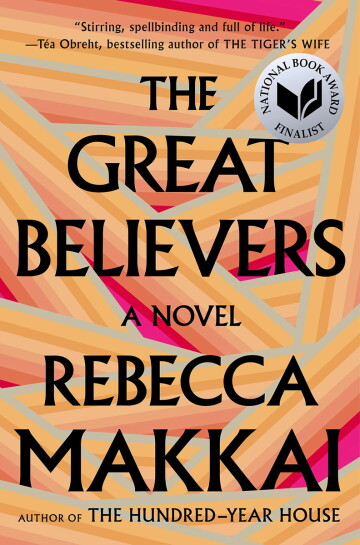Book Fest Q&A: Rebecca Makkai
Pulitzer finalist’s acclaimed novel examines impact of AIDS on the Midwest
V1 Staff |

Rebecca Makkai delves into the impact of the 1980s AIDS epidemic on her native Chicago in her 2018 novel, The Great Believers, which was a finalist for both the Pulitzer Prize in Fiction and a National Book Award. As one of the more than a dozen notable authors taking part in the 20th annual Chippewa Valley Book Festival later this month, will talk about her own experiences growing up in Chicago during the epidemic and how they informed her expansive, era-spanning novel. Below, Makkai discusses the how and why of writing her acclaimed novel.
Your characters in The Great Believers feel like very real, dynamic people. What or who inspired your creation of these characters?
I’ve never based a character on a real person, but there are slivers of different real people (and huge chunks of myself) in every character I write. In The Great Believers, some of those slivers came from the details that people shared with me about themselves or their friends back in the ’80s, and some came from elsewhere. These characters ended up feeling real to me in a way that I’ve never quite experienced before in my previous novels or stories. In particular, my main character, Yale Tishman, is someone I keep thinking of like a friend I just lost. When I get good news about the novel, I wish I could tell him about it. That might make me sound unbalanced, but it was important to my process that I got to the point of thinking of him as a real person.
The Great Believers weaves together two stories in two different cities. Why did you choose Chicago and Paris as your settings?
I grew up in Chicago and live here still, so it was much more interesting for me to explore what happened right here than to force myself to write about New York or San Francisco, which would have been more expected. Chicago is, in a way, the great love of my life. I’ll never get tired of it and I’ll never get tired of writing about it.
Oddly, the origin of my novel was something that’s now only a small part of it: the art scene in Paris between the two World Wars. I’ve always been fascinated by that time, and by the “École de Paris” set – the young artists who came to Paris from around the world – and although that shrunk to a subplot of the novel, something we hear stories about but don’t see firsthand, it’s still there and still important. The 2015 sections of The Great Believers were actually a later addition to the story. I’d written about 150 pages thinking the book was just going to be about the ’80s before I realized I needed to go back and forth in time. But when I thought about what would happen in those 2015 sections, it made sense for Paris to be the setting, echoing the scene we’ve heard about from the 1920s.
Why do you think it is important to contextualize the pervasive pain of the AIDS crisis in the modern day?
For one thing, that pain is still here. It’s tempting, in the U.S., to think of AIDS as something of the past, but globally there are 37 million people living with HIV.
Even if we are thinking of the late-’80s / early-’90s height of the U.S. crisis, and the gay community it primarily impacted: People are still living in the shadow of those years, feeling those losses, and putting their lives back together. It was important to me to write not just about the ’80s, but about the reach of the epidemic across decades.
What are the main themes of the book? What do you want people to take away from reading The Great Believers?
Ultimately, I do think The Great Believers is a defiantly hopeful book – or at least that my characters are defiantly hopeful. That’s one of the meanings of the title, I think. As their lives fall apart, they also take on greater direction and conviction. We’re living in a difficult time, and life is hard enough to begin with, but I drew so much inspiration in the past few years from talking to survivors, listening to the stories of how they fought for their lives and for each other even when it seemed utterly hopeless. If my characters can do for readers just a fraction of what these people did for me, I’ll be satisfied.
What is something you’re excited to share about your work during the festival?
I love opening up conversations about how AIDS has affected communities beyond New York and San Francisco. Many people don’t know the stories of their own areas, and as I’ve done events around the country I’ve loved watching people speak to each other, as well as to me, about their memories of the early days of the epidemic.
What book would you most want to read again for the first time?
VILLETTE, by Charlotte Bronte. It’s the only book I’ve ever thrown across the room, and I did that because I loved it so much and I was so wonderfully enraged and shocked and frustrated and thrilled.
What are you reading right now?
I’m not allowed to tell you, because I’m reading it for review! But I just finished Mira Jacob’s wonderful graphic memoir GOOD TALK, and I’m still thinking about it. I recommend it to everyone!

Rebecca Makkai will present “The Great Believers: Where Fiction Meets History,” at 7:30pm Saturday, Oct. 28, in the RCU Theatre at the Pablo Center at the Confluence. Tickets are $10, and can be purchased via the link at www.cvbookfest.org/festival-events/makkai.


















